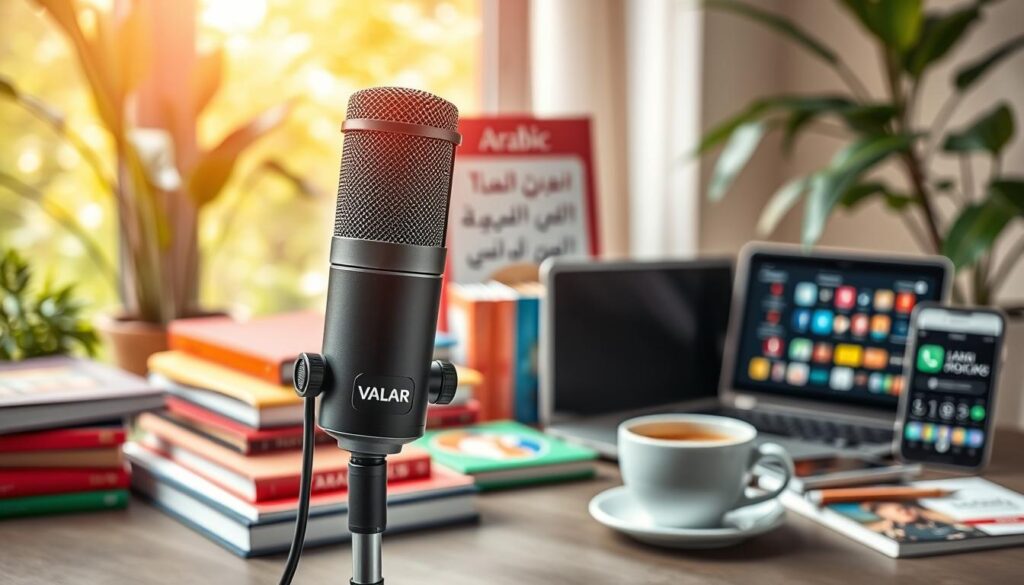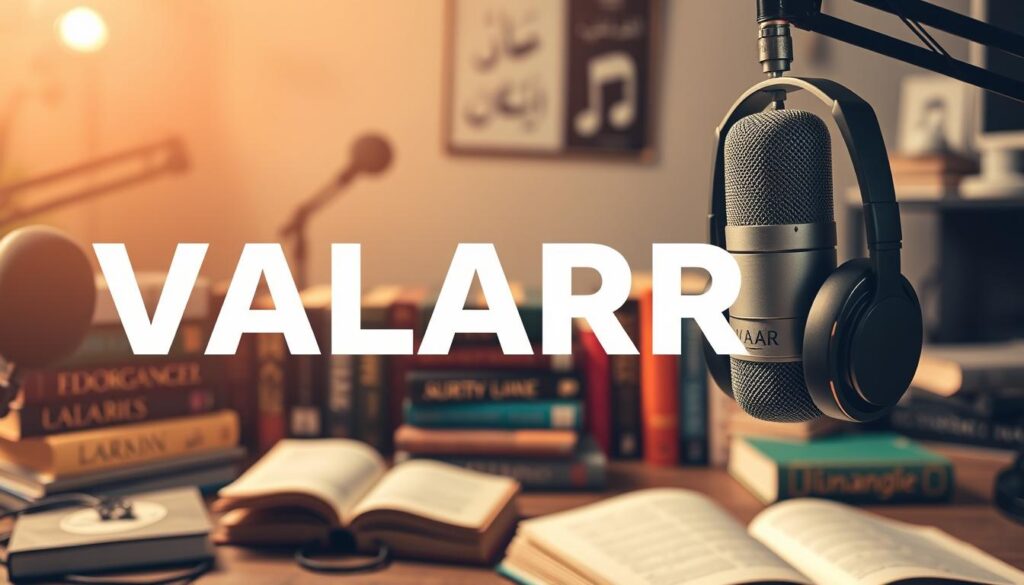Want to learn Arabic with a podcast? Podcasts are changing the game for Arabic learners around the world. They offer a flexible, on-the-go way to learn. You can listen while commuting, exercising, or just relaxing.
Podcasts give you a deep dive into Arabic sounds, grammar, and culture. You can learn from basic phrases to advanced dialects. See how these tools make learning Arabic easier.
Key Takeaways
Why Podcasts Are Revolutionizing Arabic Language Learning
Podcasts are key for learning Arabic. They offer special benefits for language learners. The audio format is especially good for those looking for the best arabic podcast for learning.
The Audio Advantage for Arabic Pronunciation
Arabic pronunciation needs practice with sounds like ‘ayn and ghayn. Podcasts like Arabiyya Bayna Yadayk let you hear native speakers. This helps you get the sounds right.
One learner said,
“Hearing these sounds daily on my commute made them feel natural.”
Flexibility and Convenience for Busy Learners
- Listen during commutes, workouts, or chores
- Pause, replay, or rewind tricky lessons
- Access content anytime via smartphones
Immersive Learning Without Travel
A podcast for arabic learners takes you to real places. You hear dialogues from Cairo markets to Dubai business meetings. Topics range from family gatherings to cultural traditions.
Podcasts are a great way to learn Arabic. They’re perfect for busy learners who need to balance work and study.
Benefits of Using Podcasts to Master Arabic
Podcasts make learning Arabic fun and real. The top podcast to learn arabic lets you hear real dialects like Egyptian or Gulf Arabic. This makes speaking and listening sound natural.
Unlike books, podcasts improve your listening skills. They fill your ears with real conversations, jokes, and news. This makes learning Arabic feel like a real adventure.
| Benefit | How It Works |
|---|---|
| Cultural Fluency | Podcasts include idioms and social customs through stories and dialogues |
| Progress Tracking | Episodic content lets learners track growth over time |
| Interest-Driven Learning | Choose episodes on topics like history or tech to stay motivated |
Many arabic learning resources podcast platforms offer transcripts or quizzes. This turns listening into active learning. You’ll feel more confident as you hear Arabic in everyday life.
Podcasts are flexible and fit into any schedule. They’re perfect for anyone, whether you love to travel or work in business. They teach you words and phrases you can use every day.
Key Features of an Effective Arabic Learning Podcast
When looking for the best arabic podcast, focus on those with proven methods. Top podcasts guide you with structured lessons. They turn listening into active learning. Here’s what makes them stand out:
Native Speaker Pronunciation
Choose podcasts hosted by native Arabic speakers. They show off the correct sounds, like ق (qāf). They also highlight how different dialects sound across regions. This helps learners pick up natural speech patterns, not just textbook sounds.
Cultural Context and Real-Life Conversations
Find episodes that mimic real-life situations, like bargaining or saying hello to neighbors. The best podcasts share stories about holidays and traditions. This makes learning the language more relatable and interesting.
Progressive Difficulty Levels
Good podcasts start with simple phrases and gradually get harder. Beginners learn basic greetings, then move on to more complex grammar. This approach avoids feeling overwhelmed and shows clear progress.
Supplementary Learning Materials
Look for podcasts that offer PDFs, word lists, and practice exercises. These extras let you review lessons at your own speed. They help you test how well you remember what you’ve learned.
These features turn listening into a full language learning system. By combining them, learners can confidently master Arabic, whether using free or paid resources.
Learn Arabic with Podcast: Our Top Recommendations
Want to learn arabic with podcast tools? These top picks mix fun content with learning structure. They’re great for beginners or those looking to get better at Arabic.
Arabic Pod 101
This podcast has over 1,000 audio lessons. It teaches Modern Standard Arabic (MSA) with cultural insights. Free lessons cover basic words, while premium offers PDFs and flashcards.
Each episode is about 20 minutes long. Perfect for daily practice.
TalkInArabic.com Podcast
This podcast focuses on Egyptian and Gulf Arabic dialects. It features dialogues with native speakers. It’s great for travelers or business people.
New episodes come out weekly. They cover topics like shopping and formal talks.
The Arabic We Speak (BBC)
Produced by BBC World Service, this podcast uses current events to teach vocabulary. Episodes are free, 15-20 minutes long, and include PDF summaries. It’s excellent for improving listening skills with real media.
Arabiyya Bayna Yadayk Podcast
This podcast is based on a bestselling textbook series. It follows a 30-lesson plan. Episodes focus on grammar and reading, with PDF exercises.
It’s perfect for self-paced learners who need a structured approach.
| Podcast | Key Focus | Cost | Episode Length |
|---|---|---|---|
| Arabic Pod 101 | MSA + cultural insights | Free/Premium | 15-30 mins |
| TalkInArabic.com | Dialects + real-world scenarios | Free | 25 mins |
| BBC Arabic We Speak | News-based vocabulary | Free | 15 mins |
| Arabiyya Bayna Yadayk | Textbook-aligned lessons | Free | 20-25 mins |
Each arabic language learning podcast has its own strengths. Check out their websites to see free vs. premium features. Choose what fits your learning goals.
Beginner-Friendly Arabic Podcasts to Start Your Journey
Starting with the right podcast for arabic learners builds confidence and clarity. These resources turn foundational lessons into engaging audio adventures. Look for shows that simplify the alphabet, basic phrases, and everyday vocabulary.
Beginners thrive with podcasts that break down complex concepts into bite-sized lessons. Here are top picks designed for first steps:
| Podcast | Key Features | Focus Areas |
|---|---|---|
| Alif Baa Basics | Slow pacing, English summaries | Alphabet, numbers, greetings |
| Arabic 101 Daily | Repeat phrases, cultural tips | Simple dialogues, grammar rules |
| Arabic Fun Start | Visual guides available, quizzes | Vocabulary, sentence structures |
Each episode in these arabic learning resources podcast series focuses on small wins. For example, Alif Baa Basics teaches writing letters through sound. Arabic 101 Daily uses short dialogues for real-world use. Try pairing episodes with free workbooks for practice. Progress happens step by step, so start with 10–15 minutes daily.
Beginners can master basics like “Marhaba” (hello) or counting to ten without overwhelm. These podcasts avoid jargon, using visuals and repetition to make tricky letters like ح and خ feel approachable. Track progress with included exercises—confidence grows quickly!
Intermediate Level Podcasts to Elevate Your Arabic Skills
When you’ve learned the basics, you might want to improve more. The top podcast to learn Arabic for this level offers specialized content. It helps you move from basic to advanced fluency.
Building Vocabulary Through Themed Episodes
Podcasts like Al Jazeera Learning and Everyday Arabic focus on specific topics. They cover healthcare, tech, and business. Each episode is like a treasure chest of new words, linked to real-life situations.
Try episodes on “Hospital Terminology” or “Modern Gulf Business Talks.” They help you learn new terms naturally.
- Business Arabic: ArabicPod101’s “Workplace Wisdom” series
- Cultural themes: TalkInArabic’s “Arts & Media” episodes
Understanding Different Arabic Dialects
“Dialects are like regional flavors of Arabic—they’re essential for real-world conversations.” – Dr. Layla Hassan, Arabic linguist
Podcasts like Dialect Dialogue explore different Arabic dialects. They compare Modern Standard Arabic with Egyptian, Levantine, or Gulf dialects. You’ll learn how to say greetings or numbers in different ways.
Improving Listening Comprehension
Podcasts such as The Arabic We Speak (BBC) feature conversations at natural speeds. Use learn arabic with podcast tips like:
- Start with transcripts, then listen without them
- Slow playback for tricky segments
- Repeat phrases aloud to mimic pronunciation
Gradually get better at understanding real conversations.
Advanced Arabic Podcasts for Near-Native Fluency
For learners aiming for near-native Arabic, authentic content is key. The best arabic podcast for learning at this level is often made for Arabic speakers. News analysis, literary discussions, and cultural debates by native speakers help grasp idioms and regional variations.
“Listening to Al Jazeera’s political analysis shows helped me decode formal vocabulary and rhetorical patterns used in professional settings.”
Popular choices include:
- “Sharq wa Gharb” (cultural debates)
- “Sout Al-Fann” (Arts and media critiques)
- “Marsad Al-Arabiyya” (linguistic trends)
Use strategies for fluency with these podcasts: pause to analyze sentences, write down new words, and explore cultural references online. For instance, a podcast on modern Egyptian literature might use colloquial phrases not found in formal arabic language learning podcast episodes.
Content like “Science in Arabic” or “Business Talks” introduces technical terms in fields like medicine or engineering. Listen to episodes with reading materials to learn new terms. Summarize episodes aloud to practice speaking like the speaker.
Reaching this milestone means you’re ready to dive into real Arabic conversations. Each episode brings you closer to speaking confidently in Arabic.
How to Effectively Learn Arabic Through Podcast Listening
To make the most of podcast for arabic learners, you need to be active. First, pick the best arabic learning resources podcast platforms. Here’s how to turn listening into learning:
Active Listening Techniques
Don’t just listen in the background. Try these techniques:
- Predictive Listening: Try to guess words before checking the answers.
- Focused Listening: Concentrate on specific grammar or dialects.
- Shadowing: Repeat what you hear right away to get the rhythm.
Note-Taking Strategies
Use these methods to jot down important points:
- Digital tools: Apps like Evernote help with right-to-left text.
- Analog notes: Write down new words in a journal with phonetic guides.
- Visual cues: Use symbols or diagrams to highlight cultural context.
Spaced Repetition for Retention
Improve memory with spaced repetition. Try apps like:
| App | Features | Arabic Support |
|---|---|---|
| Anki | Custom flashcards | ✅ |
| Memrise | Video + audio drills | ✅ |
Review what you learned 1 day, 3 days, and 7 days later.
Speaking Practice with Podcast Content
Make listening a speaking practice:
- Act out scenarios from the podcast.
- Record your answers to podcast questions.
- Join online groups to talk about the episodes.
Use these tips to improve your Arabic speaking. Start small and adjust as needed.
Combining Podcasts with Other Arabic Learning Resources

Podcasts are great, but using them with other tools can make learning better. Here’s how to create a well-rounded study plan:
Textbook and Podcast Integration
Match top podcast to learn arabic episodes with books like Al-Kitaab or Arabiyya Bayna Yadayk. For example:
| Podcast | Recommended Textbook |
|---|---|
| Arabic Pod 101 | Alif Baa: Introduction to Arabic |
| The Arabic We Speak | Integrated Arabic Skills |
Language Apps as Complementary Tools
Apps like Anki or Memrise make podcast words into flashcards. Try this weekly plan:
- Listen to a learn arabic with podcast episode (e.g., TalkInArabic.com).
- Make quizzes on new words with the app.
- Use spaced repetition to review.
Online Tutoring to Clarify Podcast Concepts
Platforms like iTalki or Preply help with tricky grammar. For instance:
- After hearing a complex verb tense in a podcast, book a tutor session.
- Practice speaking with phrases from episodes.
“Mixing podcasts with apps and tutors made my Arabic conversations flow naturally.” – Sarah, intermediate learner
Common Challenges When Learning Arabic Through Podcasts and How to Overcome Them
Learning Arabic through podcasts is flexible. But, you might face issues like getting confused between dialects or feeling overwhelmed by new words. Here are some tips to help you:
- Dialect diversity: Arabic has different dialects. Start with Modern Standard Arabic (MSA) from the best arabic podcast for learning like Arabiyya Bayna Yadayk. Then, you can explore different dialects.
- Too many new words: Learn 5-7 key words each episode. Use flashcards to remember them later.
- Slowing progress: Set weekly goals, like mastering a dialogue. Join online forums like TalkInArabic for support.
- Pacing issues: Podcast apps let you slow playback without distorting Arabic sounds. Try playing at 0.75x speed for better clarity.
- Matching skill levels: Check episode descriptions. The podcast for arabic learners Al-Fusha Weekly labels episodes as beginner/advanced to help you choose.
“I stuck to one dialect at first and used transcripts from Arabic Pod 101 to decode tricky phrases. Consistency beat confusion!” – Maria, Arabic learner
Remember, hitting a plateau is normal. Celebrate small victories, like understanding a news clip or having a 2-minute conversation. Adjust your tools and resources as you improve. Every challenge brings you closer to becoming fluent.
Success Stories: Language Learners Who Mastered Arabic Through Podcasts
Podcasts are more than just shows. They are paths to speaking fluently. Thousands have used learn arabic with podcast methods to reach goals they thought were out of reach. Here’s how real learners turned their passion into progress.
From Beginner to Fluent: Real Student Journeys
Meet three learners whose journeys show that podcast learning works:
- Emma, Teacher: Started with arabic language learning podcast episodes. After 18 months using Arabic Pod 101’s structured content, she taught introductory Arabic classes at her school.
- Michael, Business Analyst: Listened to TalkInArabic.com daily during commutes. Within two years, he negotiated deals in MSA and Gulf dialects, earning a promotion.
- Leila, Student: Used BBC’s The Arabic We Speak to master conversational skills. She now translates for a nonprofit, bridging communication gaps in refugee aid programs.
Professional Benefits of Podcast-Based Arabic Learning
Podcasts open doors to global opportunities. As
“Hearing authentic dialects on my daily commute gave me the confidence to work in Cairo,”
said journalist Carlos, who landed a Middle East assignment after using BBC podcasts. Professionals like him use podcasts to:
- Secure international job postings requiring MSA proficiency
- Communicate with clients in markets like Dubai and Cairo
- Advance careers in fields like diplomacy and aid work
Even Arabic Pod 101’s blog features stories of learners who turned podcast listening into career leaps. Consistency and active practice are key—like engineer Priya, who mastered technical terms via themed episodes and now works on renewable energy projects in Jordan.
These stories show Arabic isn’t just for school—it’s a way to make a real difference. Your journey starts with one episode today.
Arabic Dialects Covered in Popular Learning Podcasts
Arabic has many regional dialects. The right arabic learning resources podcast depends on your goals. Major dialects include Levantine (Jordan/Syria/Lebanon), Egyptian, Gulf (Khaleeji), Maghrebi, and Iraqi. Podcasts often focus on one dialect or compare them with Modern Standard Arabic (MSA).
- Levantine Focus: Podcasts like The Arabic We Speak teach everyday Syrian/Lebanese dialects.
- Egyptian Mastery: TalkIn Arabic episodes simulate Cairo street conversations.
- Gulf Insights: Arabiyya Bayna Yadayk covers Khaleeji phrases used in UAE/Qatar.
- Cross-Dialect Comparisons: Arabic Pod 101 episodes highlight differences between Egyptian and MSA vocabulary.

“Learning Egyptian first helped me understand 80% of Arabic media,” said a learner on Reddit. “Podcasts made dialects less intimidating.”
Choose dialects based on travel plans, heritage, or media preferences. The top podcast to learn arabic for your target dialect often includes cultural context. This makes learning relatable. Explore platforms like Apple Podcasts or Spotify to compare shows focusing on your chosen variety.
Free vs. Premium Arabic Learning Podcasts: What’s Worth Your Money
When picking between free and paid podcast for arabic learners, think about what you need. Premium services give you structured lessons but cost money. Free podcasts are easy to find but might not have all the tools you need. Here’s how to choose what’s right for you.
Value Analysis of Subscription-Based Services
Premium platforms like Arabic Pod 101 or TalkInArabic offer:
- Interactive transcripts with click-to-learn vocabulary
- Teacher feedback on speaking exercises
- Progress tracking dashboards
Monthly fees are usually $10–$25. People say they learn faster with these tools.
Hidden Gems Among Free Resources
| Feature | Free | Premium |
|---|---|---|
| Vocabulary quizzes | Basic | Advanced |
| Episode access | Full episodes | Exclusive bonus content |
| Community forums | Limited | Full access |
Free podcasts like The Arabic We Speak (BBC) give you basic lessons for free. Freemium models like Arabiyya Bayna Yadayk offer free audio but charge for workbooks. Always try free trials before you pay.
Conclusion: Starting Your Arabic Learning Journey with the Perfect Podcast
Learning Arabic with podcasts is a flexible way to improve your skills. It’s great for beginners and those who are more advanced. Find a podcast that fits your learning goals, like Arabic Pod 101 for lessons or BBC’s The Arabic We Speak for everyday conversations.
Start with 15 minutes a day, listening carefully and writing down important phrases. As you get better, increase the time. Remember, it’s the regular effort that pays off. Use sites like TalkInArabic.com with flashcards or apps to help with vocabulary.
Podcasts offer a window into Arabic culture and language. They introduce you to literature, media, and global communities. Try free trials of Arabiyya Bayna Yadayk for different dialects or subscribe to paid services for more advanced lessons. Each episode brings you closer to speaking Arabic fluently.
Take the first step today. Pick a podcast, set a 15-minute timer, and start listening. The Arabic language is waiting for you. Your cultural and professional opportunities are just a click or download away. Let your curiosity lead the way.

